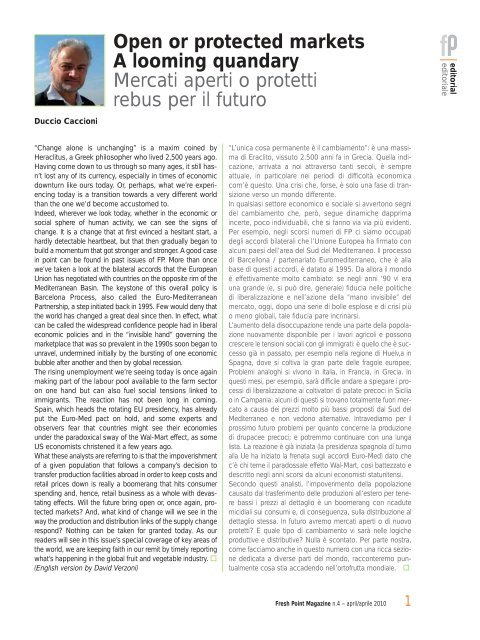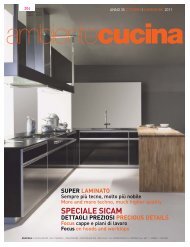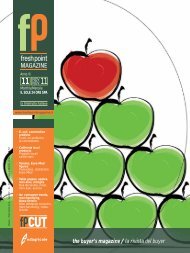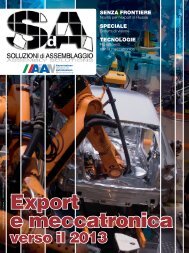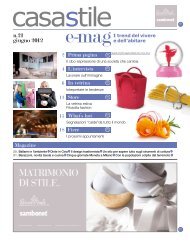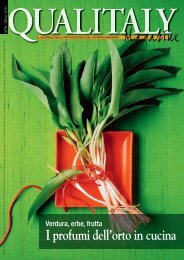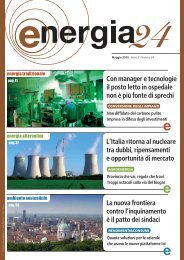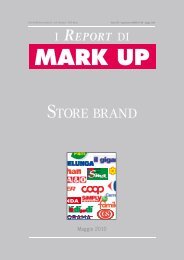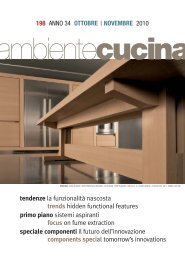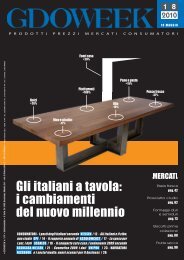Fresh Point Magazine - B2B24 - Il Sole 24 Ore
Fresh Point Magazine - B2B24 - Il Sole 24 Ore
Fresh Point Magazine - B2B24 - Il Sole 24 Ore
You also want an ePaper? Increase the reach of your titles
YUMPU automatically turns print PDFs into web optimized ePapers that Google loves.
Duccio Caccioni<br />
Open or protected markets<br />
A looming quandary<br />
Mercati aperti o protetti<br />
rebus per il futuro<br />
“Change alone is unchanging” is a maxim coined by<br />
Heraclitus, a Greek philosopher who lived 2,500 years ago.<br />
Having come down to us through so many ages, it still hasn’t<br />
lost any of its currency, especially in times of economic<br />
downturn like ours today. Or, perhaps, what we’re experiencing<br />
today is a transition towards a very different world<br />
than the one we’d become accustomed to.<br />
Indeed, wherever we look today, whether in the economic or<br />
social sphere of human activity, we can see the signs of<br />
change. It is a change that at first evinced a hesitant start, a<br />
hardly detectable heartbeat, but that then gradually began to<br />
build a momentum that got stronger and stronger. A good case<br />
in point can be found in past issues of FP. More than once<br />
we’ve taken a look at the bilateral accords that the European<br />
Union has negotiated with countries on the opposite rim of the<br />
Mediterranean Basin. The keystone of this overall policy is<br />
Barcelona Process, also called the Euro-Mediterranean<br />
Partnership, a step initiated back in 1995. Few would deny that<br />
the world has changed a great deal since then. In effect, what<br />
can be called the widespread confidence people had in liberal<br />
economic policies and in the “invisible hand” governing the<br />
marketplace that was so prevalent in the 1990s soon began to<br />
unravel, undermined initially by the bursting of one economic<br />
bubble after another and then by global recession.<br />
The rising unemployment we’re seeing today is once again<br />
making part of the labour pool available to the farm sector<br />
on one hand but can also fuel social tensions linked to<br />
immigrants. The reaction has not been long in coming.<br />
Spain, which heads the rotating EU presidency, has already<br />
put the Euro-Med pact on hold, and some experts and<br />
observers fear that countries might see their economies<br />
under the paradoxical sway of the Wal-Mart effect, as some<br />
US economists christened it a few years ago.<br />
What these analysts are referring to is that the impoverishment<br />
of a given population that follows a company’s decision to<br />
transfer production facilities abroad in order to keep costs and<br />
retail prices down is really a boomerang that hits consumer<br />
spending and, hence, retail business as a whole with devastating<br />
effects. Will the future bring open or, once again, protected<br />
markets? And, what kind of change will we see in the<br />
way the production and distribution links of the supply change<br />
respond? Nothing can be taken for granted today. As our<br />
readers will see in this issue’s special coverage of key areas of<br />
the world, we are keeping faith in our remit by timely reporting<br />
what’s happening in the global fruit and vegetable industry.<br />
(English version by David Verzoni)<br />
“L’unica cosa permanente è il cambiamento”: è una massima<br />
di Eraclito, vissuto 2.500 anni fa in Grecia. Quella indicazione,<br />
arrivata a noi attraverso tanti secoli, è sempre<br />
attuale, in particolare nei periodi di difficoltà economica<br />
com’è questo. Una crisi che, forse, è solo una fase di transizione<br />
verso un mondo differente.<br />
In qualsiasi settore economico e sociale si avvertono segni<br />
del cambiamento che, però, segue dinamiche dapprima<br />
incerte, poco individuabili, che si fanno via via più evidenti.<br />
Per esempio, negli scorsi numeri di FP ci siamo occupati<br />
degli accordi bilaterali che l’Unione Europea ha firmato con<br />
alcuni paesi dell’area del Sud del Mediterraneo. <strong>Il</strong> processo<br />
di Barcellona / partenariato Euromediterraneo, che è alla<br />
base di questi accordi, è datato al 1995. Da allora il mondo<br />
è effettivamente molto cambiato: se negli anni ‘90 vi era<br />
una grande (e, si può dire, generale) fiducia nelle politiche<br />
di liberalizzazione e nell’azione della “mano invisibile” del<br />
mercato, oggi, dopo una serie di bolle esplose e di crisi più<br />
o meno globali, tale fiducia pare incrinarsi.<br />
L’aumento della disoccupazione rende una parte della popolazione<br />
nuovamente disponibile per i lavori agricoli e possono<br />
crescere le tensioni sociali con gli immigrati: è quello che è successo<br />
già in passato, per esempio nella regione di Huelv,a in<br />
Spagna, dove si coltiva la gran parte delle fragole europee.<br />
Problemi analoghi si vivono in Italia, in Francia, in Grecia. In<br />
questi mesi, per esempio, sarà difficile andare a spiegare i processi<br />
di liberalizzazione ai coltivatori di patate precoci in Sicilia<br />
o in Campania: alcuni di questi si trovano totalmente fuori mercato<br />
a causa dei prezzi molto più bassi proposti dal Sud del<br />
Mediterraneo e non vedono alternative. Intravediamo per il<br />
prossimo futuro problemi per quanto concerne la produzione<br />
di drupacee precoci; e potremmo continuare con una lunga<br />
lista. La reazione è già iniziata (la presidenza spagnola di turno<br />
alla Ue ha iniziato la frenata sugli accordi Euro-Med) dato che<br />
c’è chi teme il paradossale effetto Wal-Mart, così battezzato e<br />
descritto negli anni scorsi da alcuni economisti statunitensi.<br />
Secondo questi analisti, l’impoverimento della popolazione<br />
causato dal trasferimento delle produzioni all’estero per tenere<br />
bassi i prezzi al dettaglio è un boomerang con ricadute<br />
micidiali sui consumi e, di conseguenza, sulla distribuzione al<br />
dettaglio stessa. In futuro avremo mercati aperti o di nuovo<br />
protetti? E quale tipo di cambiamento vi sarà nelle logiche<br />
produttive e distributive? Nulla è scontato. Per parte nostra,<br />
come facciamo anche in questo numero con una ricca sezione<br />
dedicata a diverse parti del mondo, racconteremo puntualmente<br />
cosa stia accadendo nell’ortofrutta mondiale.<br />
<strong>Fresh</strong> <strong>Point</strong> <strong>Magazine</strong> n.4 – april/aprile 2010<br />
1<br />
editorial<br />
editoriale


